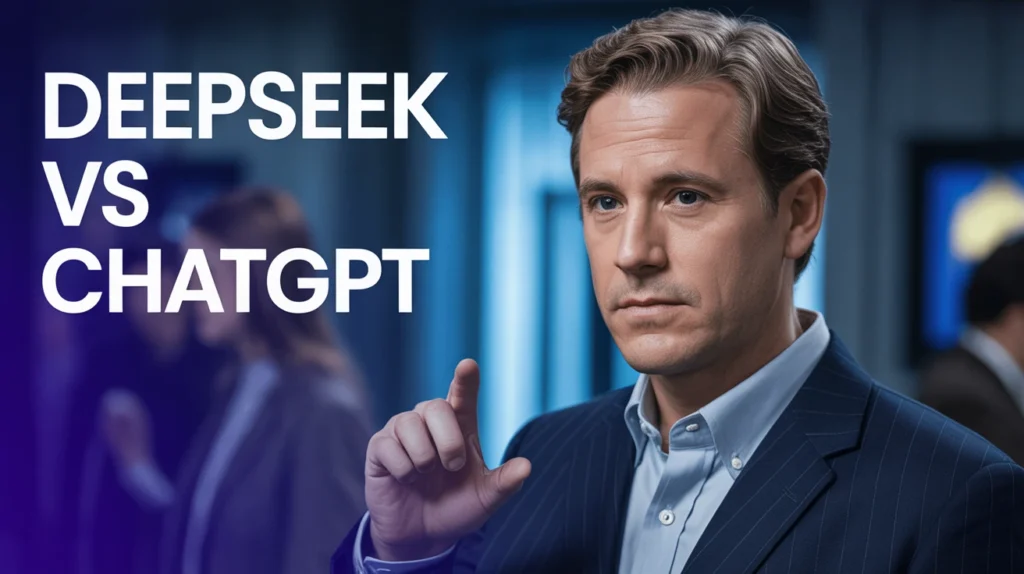Introduction
Artificial Intelligence (AI) has taken the world by storm, and conversational AI tools are at the heart of this revolution. From writing articles to answering complex coding questions, AI models have transformed the way we interact with technology. Among the rising stars in this space are DeepSeek and ChatGPT.
Both tools are highly capable, but they are designed with different strengths and approaches. ChatGPT, developed by OpenAI, has already built a massive global presence, being integrated into businesses, apps, and everyday workflows. On the other hand, DeepSeek is an emerging AI model that has started making waves with its innovative design and competitive edge in certain areas.
So, the big question is: DeepSeek vs ChatGPT – which one should you use?
In this article, we’ll dive deep into their features, strengths, weaknesses, and practical applications, helping you make the best choice for your personal or business needs.
What is DeepSeek?
DeepSeek is a relatively new but powerful conversational AI model. Unlike traditional chatbots, it is designed to provide intelligent, context-aware, and versatile interactions across different domains.
- Origin and Development: DeepSeek has been developed with a focus on advanced natural language processing (NLP) and real-time adaptability. Its creators have emphasized making it efficient, lightweight, and capable of handling multiple industries’ needs.
- Core Features: DeepSeek focuses on fast responses, adaptive learning, and specialized outputs for tasks like customer service, content creation, and technical support. It also claims to reduce biases and hallucinations compared to some mainstream AI tools.
- Target Audience: DeepSeek appeals to startups, businesses, and developers who want a cost-effective yet high-performing alternative to existing AI solutions. It positions itself as a direct competitor to OpenAI’s ChatGPT and other large language models (LLMs).
What makes DeepSeek stand out is its attempt to balance affordability with high performance, making it particularly attractive for companies looking to integrate AI without breaking the bank.
What is ChatGPT?
ChatGPT, developed by OpenAI, is one of the most popular AI-powered conversational tools in the world. First launched in late 2022, it quickly captured global attention with its human-like text generation and versatility.
- Background and Development: ChatGPT is based on the GPT (Generative Pre-trained Transformer) architecture. Its most advanced version, GPT-5, continues to push boundaries in AI conversation, creativity, and reasoning.
- Core Features: ChatGPT can write essays, create marketing content, answer coding questions, generate summaries, brainstorm ideas, and even hold natural conversations. With continuous fine-tuning, it has become highly effective in handling both casual and professional use cases.
- Target Audience: ChatGPT caters to a wide spectrum of users—students, professionals, content creators, educators, marketers, and enterprises. Its accessibility through ChatGPT Web, API, and integrations like Microsoft Copilot makes it a household name.
In essence, ChatGPT has set the industry standard for conversational AI, making it the model that every new competitor, including DeepSeek, is measured against.
DeepSeek vs ChatGPT: Key Differences
While both DeepSeek and ChatGPT are conversational AI tools, they differ in technology, performance, and use cases. Let’s break down some of their major differences:
- Technology:
ChatGPT is powered by OpenAI’s GPT architecture, one of the most sophisticated AI frameworks available today. DeepSeek, on the other hand, is designed with efficiency-first architecture, which prioritizes faster responses and lower computing costs. - Training Data:
ChatGPT benefits from being trained on massive datasets from diverse sources, giving it a wide knowledge base. DeepSeek is relatively new, with a smaller training corpus, but optimized to deliver precision in specific tasks. - Natural Language Understanding (NLU):
ChatGPT excels in creative writing and nuanced conversations, whereas DeepSeek is designed to be more straightforward and business-focused, often avoiding unnecessary fluff in responses.
So, while ChatGPT shines in breadth and creativity, DeepSeek emphasizes speed, affordability, and practicality.
Performance Comparison
When it comes to performance, both AI models have their strengths and weaknesses:
- Accuracy in Answers:
ChatGPT generally provides more accurate and detailed answers across diverse topics because of its extensive training. DeepSeek, however, aims for conciseness and relevance, which can be better suited for professional settings. - Creativity and Content Generation:
If you’re looking for storytelling, brainstorming, or marketing content, ChatGPT leads the way with its advanced creativity. DeepSeek is more structured and direct, making it ideal for customer service scripts or technical replies. - Speed and Efficiency:
DeepSeek often outpaces ChatGPT in response time, thanks to its lightweight architecture. This makes it particularly appealing for businesses that require instant replies.
In short, ChatGPT is more versatile, while DeepSeek is more efficient. The choice depends on whether you prioritize depth or speed.



